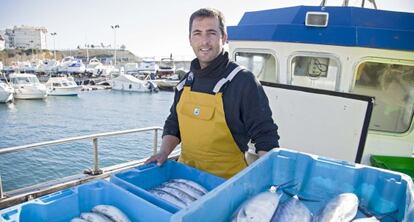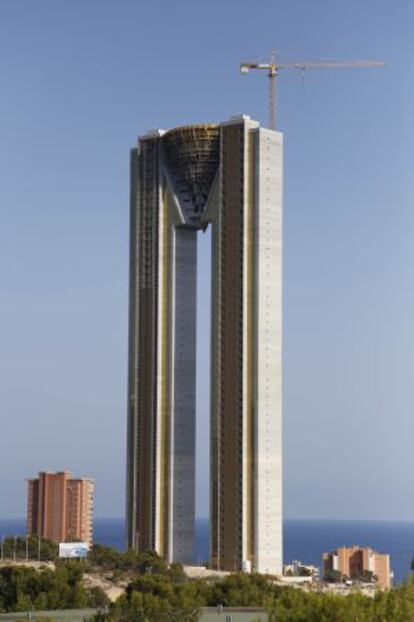Benidorm’s last traditional fisherman
José Miguel Martínez operates the only artisanal boat left in the high-rise resort


José Miguel Martínez walks along, sharing the last moments of the night with the dozens of seniors out for a stroll on Benidorm’s ample promenade.
The morning breeze can only barely be felt when dawn breaks and the 40-year-old fisherman heads out to sea. Starting up his 46-horsepower engine, he steers his boat into the Mediterranean and away from the concrete skyline rising up behind him.
He’s not going far: three miles at the most. There, he will cast the nets that provide the nearby town of Altea with melva and bonito, two members of the tuna and mackerel family.
The fish are sold there because Benidorm, once a traditional coastal village on the Alicante coast, has not held a fish auction for many years. Tourism first took hold here in the 1950s, and the city soon became a magnet for package tours from the rest of Spain and Britain, then for elderly Europeans looking for good year-round weather.
Yesterday was not a good day. Of course, if they were all good days, people would want to do this” José Miguel Martínez, artisanal fisherman
Yet this is where José Miguel, Benidorm’s only remaining traditional fisherman, makes his living. “The tradition has been lost in Benidorm because there were a lot of job offers on land and people went for the easy stuff,” he says.
José Miguel is the last in a long line of seafarers known as Els Tabarquines because his forebears came from the Mediterranean island of Tabarca. His father, uncles, grandfather and even earlier relatives all fished along the Mediterranean coast. “But I just don’t see my children, who are 12 and eight, on board a ship,” he says.
Traditional artisanal fishing has been facing problems for a long time, not just here but all over Spain, where young people are loath to take over from their parents.
The figures illustrate the dip: the traditional fishing fleet has dropped 25 percent in just seven years. Of 10,233 vessels registered in 2006, only 7,602 remained operative last year, according to the Agriculture Ministry.
“This drop is the result of a series of factors,” says Celia Ojeda, head of the Oceans department at Greenpeace and a participant in the industry report Empleo a bordo (Employment on board), drafted by consultancy Abay Analistas.
First, this expert notes, authorities progressively reduced the sector’s catch share in favor of industrial fishing; then, their subsidies were eliminated altogether; and lastly, these workers face “worse labor conditions.”
According to the study, the average salary for a traditional fisherman is €7,796 a year, far lower than the €23,020 to be made on an industrial fishing boat.
“Many of the people who went to work in construction have had to return to the sea, but there is very little generational change,” she explains. “They can’t find the necessary investment to get started, to buy their own vessel. After all, a boat is a mortgage.”
José Miguel walks slowly along the pier where he grew up. This is where he first began going out to sea at age 16, and this is where his boat, the Cayetano Francisca II, is berthed. The 10.5-meter long vessel shares the marina with sailboats, recreational boats, the Aquascope – a tourist boat with a see-through bottom – and other fishing vessels whose owners live in the nearby town of El Campello.
It is a far cry from his early days as a sailor, when “there were five or six artisan ships” gently rocking together in the wharf. His father Miguel and his uncle Vicente, ages 83 and 81, smile. “In our time there were as many as 15.”

Vicente and Miguel are pushing a heavy cart filled with 500 meters of used-up nets down the pier towards the trash containers. Both men still have enough strength left in them to show up at the port at 6am every day.
“This is our life,” they say in Valencian, a form of Catalan spoken widely in the region.
The day before, the nets ripped under the weight of all the trash they picked up underwater; the incident means a whole week without fishing, without income.
“Yesterday was not a good day,” says José Miguel. “Of course, if they were all good days, people would want to do this.”
For the last three years, José Miguel has had a shipmate named Faisal, a man with strong arms who hails from the Moroccan town of Kenitra. The €800 they make in an average week gets shared out between them on a 75-25 basis, although expenses have to be deducted first. A good week might bring in anywhere between €1,500 and €2,000.
But this is an unpredictable trade. After the net incident, José Miguel spent nearly another week more on land because of the bad weather, which prevented him from using the mountains and the skyscrapers as his navigational guides.
Tu suscripción se está usando en otro dispositivo
¿Quieres añadir otro usuario a tu suscripción?
Si continúas leyendo en este dispositivo, no se podrá leer en el otro.
FlechaTu suscripción se está usando en otro dispositivo y solo puedes acceder a EL PAÍS desde un dispositivo a la vez.
Si quieres compartir tu cuenta, cambia tu suscripción a la modalidad Premium, así podrás añadir otro usuario. Cada uno accederá con su propia cuenta de email, lo que os permitirá personalizar vuestra experiencia en EL PAÍS.
¿Tienes una suscripción de empresa? Accede aquí para contratar más cuentas.
En el caso de no saber quién está usando tu cuenta, te recomendamos cambiar tu contraseña aquí.
Si decides continuar compartiendo tu cuenta, este mensaje se mostrará en tu dispositivo y en el de la otra persona que está usando tu cuenta de forma indefinida, afectando a tu experiencia de lectura. Puedes consultar aquí los términos y condiciones de la suscripción digital.








































